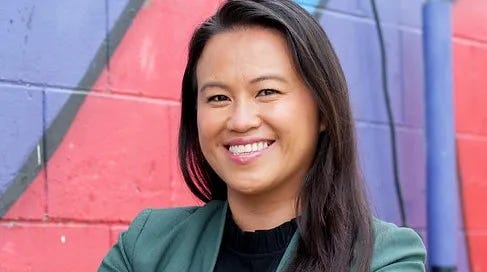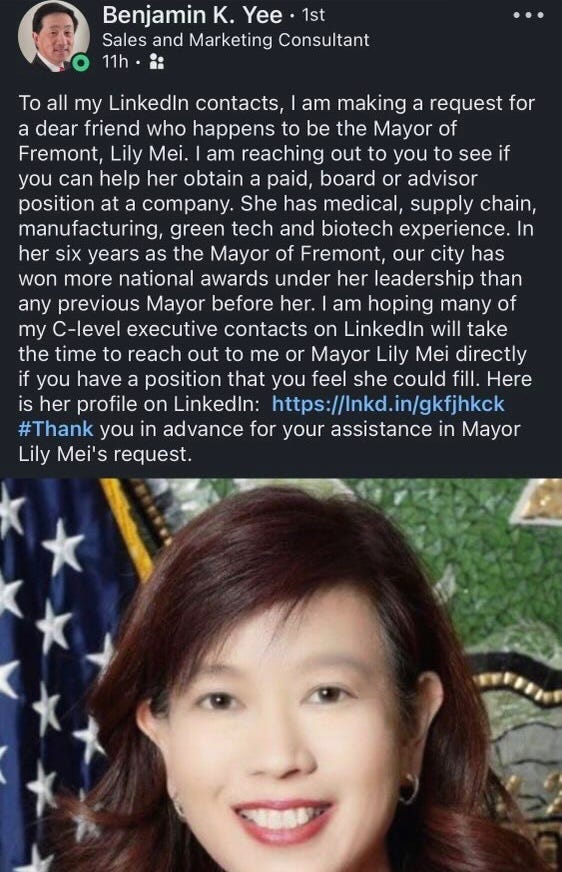Post-election analysis: What just happened in the East Bay?!
Big winners: Labor, The Bontas, Aisha Wahab, progressives. SD10 loser Lily Mei is looking for a day job
ELECTION 2022
OAKLAND MAYOR
—NEW ERA—Sheng Thao is Oakland’s mayor-elect after one of the city’s most topsy-turvy elections ever. Thao inherits a city grappling with rising crime, homelessness, and the likelihood of a recession on the horizon that could further squeeze city services
—Oakland’s city council and mayor’s office will have an undeniable progressive bent starting next year. This power, however, comes with potential pitfalls. Oakland progressives don’t just ask for change, they demand it forcefully and sometimes angrily. How does Thao deal with the left?
—How does she maneuver the realities of the governing with potential budget shortfalls cascading from the state along with Oakland’s own precarious city budget? Eventually Thao will have to deliver results for SEIU Local 1021, the city’s largest public employees union, a group that poured nearly $1 million into get her elected.
—Then there’s potentially Thao first test while in office—Howard Terminal—coming sometime in the new year. It’s possible that Thao will be less rigid than Libby Schaaf when it comes to how to pay for the A’s ballpark. If, for example, Thao pushes for municipal bonds, the A’s would be happy to quickly seal the deal. Doing so, however, will play into the hands of Howard Terminal opponents who view the project as a giveaway to billionaire owner John Fisher.
—At least in the short-term, Thao will have to deal with perceptions that her victory is illegitimate because she did not win the most first-place votes. It’s the second time this has happened in Oakland. In 2010—the first use of ranked-choice voting—Jean Quan won without popular support. The same year it happened in San Leandro’s mayoral race. In both cases, for different reasons, the incumbent served only four years.
—IDLF SCREWED UP—In the end Ignacio De La Fuente and probably the big money spent by Big Coal to help him, tippped the race from Loren Taylor to Sheng Thao.
—Clearly De La Fuente’s campaign screwed up by failing to teach its supporters the nuances of ranked-choice voting. It’s unconscionable that so many of De La Fuente’s supporters marked only his name and left the other four bubbles blank. It’s not likely that De La Fuente’s voters intended to help elect a progressive mayor like Thao,
—The $550,000 outlay by Jon Brooks and Big Coal did not help De La Fuente’s chances and it may have dragged down Taylor. When the margin of victory is roughly 650 votes, any mistake may have been the deciding factor. Thao’s move to link De La Fuente and coal to Taylor may have won it for her, even though the strategy was employed just days before Election Day.
DEFUND THE POLICE
—DEFUND WINNERS—Prior to the fall election, I wrote about the possibility that candidates who supported defunding the police in 2020 might escaped unscathed at the ballot box, despite worries about rising crime. This is exactly what happened.
—Sheng Thao won the mayor’s race, Oakland Councilmember Nikki Fortunato Bas won re-election in District 2, and Janani Ramachandran ran away with a win in District 4. Celina Reynes, who helped lead the push for San Leandro’s citizen police oversight committee, easily won a council seat.
—Rebecca Kaplan, however, paid a price for being an early backer of defunding the police and it may have been all her fault. Whereas, the others mentioned above kept the issue of crime at arms length, Kaplan faced it head-on in the primary (which she won) and in the General Election.
—Maybe it wasn’t a good idea for Kaplan to repeatedly highlight her admittedly strong record in getting guns off the streets? But it gave opponent Lena Tam an opportunity to hammer Kaplan for her wanting to defund the police along with cementing in the voters minds Kaplan’s connection to Oakland and perceptions across the supervisorial district that the city is unsafe.
ALAMEDA COUNTY BOARD OF SUPERVISORS
—SIMPLY THE BEST—Political consulting in the East Bay is a racket filled with unimaginative amateurs. Then there’s Doug Linney, who is the region’s top consultant by such a distance that all others seem like they’re playing a different game.
—With Lena Tam’s big victory, Linney may have outdid himself. For context, Linney was behind Yesenia Sanchez’s massive upset of Alameda County Sheriff Greg Ahern last summer. Perhaps the biggest upset in Alameda County history.
—In the supervisorial runoff this fall, Linney had to overcome a dominate primary victory by Kaplan. In addition, he had to do it with Tam, ostensibly a has-been in East Bay politics out of the game since last serving on the Alameda City Council a decade ago. That’s equal to a few lifetimes out of local office. Tam couldn’t even match Robert Raburn in the 2014 race for the BART board.
—Yet, Tam quite easily dispatched Kaplan this November by repeatedly skewering her stance on public safety. Furthermore, Linney did it with a candidate who was strongly backed by the California Apartment Association, a group not very popular in Oakland, Alameda, and parts of San Leandro. It was truly an amazing performance by the candidate and the consultant.
THE BONTAS
—BONTA WINS—Not only did the Bontas sail to victory on Election Night—Rob Bonta won a full term as California attorney general, and Mia Bonta won re-election to the 18th Assembly District—but they also won two shrewd bets made last year.
—Despite the misdirection, Rob Bonta indeed cleared the field last year to help his wife, Mia Bonta, in her bid to replace him in the assembly. To do so, Sheng Thao was promised their support in her bid for mayor. What occurred later was a massive financial effort by SEIU Local 1021 to make sure Thao became the next mayor.
—It didn’t look good for the Bontas, but Thao pulled out a last-minute victory in the Oakland mayor’s race. Similarly at the Alameda County Board of Supervisors, Rob Bonta led the effort to appoint a caretaker—a white male— to serve the remainder of the late Wilma Chan’s term, rather than ensure the seat was occupied by an Asian American woman. Someone like, say, Alameda Councilmember Malia Vella?
—It didn’t look good for the Bontas when Rebecca Kaplan sprinted to a sizable primary win in June. But Lena Tam, a fellow Alamedan, pulled off the upset last week in quite a decisive manner.
SAN LEANDRO
—UNEVEN RESULTS—San Leandro voters appear very confused. Voters opted to fortify a left-leaning city council with two new progressive members—Celina Reynes and Xoahua Bowen, who won the seat by just 37 votes over Monique Tate. There is now a clear majority next year to bring potentially significant rent control legislation to the city.
—Yet, San Leandro voters narrowly elected Juan Gonzalez, easily the most conservative candidate in the race. When it comes to mayor, San Leandro voters clearly said they want total change. Nearly three-fourths of the electorate supported Bryan Azevedo, a candidate of questionable intellect, or Gonzalez, a first-time candidate for office.
—During the same election, San Leandro voters helped lead the way for Lena Tam’s supervisorial win, despite her support from landlords. So they voted for a council to help renters, at the same time backing a supervisor who may potentially stifle the same issue on the county level.
POLLING
—LET’S HEAR IT FOR THE POLLS—Campaign polling is expensive and most of it is done privately and kept internal. But the few that the public was able to see were pretty accurate.
—An Oakland Chamber of Commerce poll last month proved quite accurate in the mayor’s race. In terms of first-place votes, the survey showed Loren Taylor with 33 percent of the vote, followed by Sheng Thao at 31 percent. That was dead on. Taylor received 33.07 percent and Thao pulled down 31.79 percent.
—In San Leandro’s equally riveting mayoral race, polling showed Bryan Azevedo and Juan Gonzalez separated by a few points. Azevedo won 37.25 percent of the first-place vote, followed by Gonzalez’s 36.92 percent.
10TH STATE SENATE DISTRICT
—IN THE END A BLOWOUT—There were two races in the East Bay that almost everybody expected to be extremely close. One was the Oakland mayor’s race, which came to fruition, the other was the 10th State Senate District race between Aisha Wahab and Lily Mei, which did not.
—Mei won the primary by three points and led by nearly the same amount when the first results were released on Nov. 8. It turned out to be a bad sign for Mei. Over the next 10 days Wahab quickly overpassed Mei and built a commanding lead. As of Tuesday, Wahab outpaced Mei countywide by nearly 16,000 votes. How did it happen?
—This race is a big win for labor, who clearly delivered for Wahab on the mailers front and with an impressive ground game. The barrage of mailers highlighting Mei’s involvement in Fremont’s city manager scandal was clearly a difference maker. Voters on every segment of the political spectrum do not like the appearance of government impropriety.
—Somewhat under the radar is the fact that Wahab won a big-time state legislative race without the use of a paid consultant. It’s a testament to her political savvy. Wahab’s fingerprint were intimately all over this campaign. The same could not be said for Mei.
—Nearly $8 million was spent by labor and special interests on this race. Mei’s campaign showed quite early in the fall election season that she had effectively ceded control of her campaign to Independent Expenditure Committees through their messaging. The IEs went extremely negative against Wahab, but unlike Mei’s controversies, the attacks were flimsy or sheer nonsense, like the one about Wahab being wealthy.
—YOU DID NOT SEE THIS—What’s this guy going to do about this?
—History tells us that Rep. Ro Khanna will painstakingly attempt to act like he never supported Lily Mei. Back when Khanna ran unsuccessfully in 2014 as a tech-friendly congressional candidate, he remade himself in 2016 as the uber-progressive we know today.
—WHAT’S NEXT FOR MEI—During the election, there was chatter that two candidates in the East Bay had personal financial incentive for winning their respective races. One was Pamela Price in the district attorney’s race. The other was Lily Mei.
—It’s unclear what Mei does for a day job. We also know that she is either finalizing her divorce or it’s already complete. Over the weekend, Fremont Planning Commissioner Benny Yee, also a constant companion of Mei’s on the campaign trail, revealed that Mei is looking for a job. Yee posted a version of Mei’s resume on social media, asking for any leads for a C-suite job for the mayor, who has two years remaining on her last term in office.
CONGRSSIONAL CANDIDATE ARRESTED
—SWALWELL’S OPPONENT—The East Bay congressional candidate who was arrested last Friday night at the registrar’s office spoke out about the incident at today’s Board of Supervisors meeting.
—“They were itching to arrest me,” said Alison Hayden, the Republican candidate this fall for the East Bay’s 14th Congressional District. Hayden, and others on Tuesday afternoon, criticized Alameda County Registrar Tim Dupuis’ handling of the election.
—Hayden said the registrar would only accept written questions about the vote-counting process. Prior to being arrested, Hayden said she was silent, but upon posing a question to a sheriff’s deputy, the response was aggressive. Hayden was arrested and released from Santa Rita Jail on Saturday.
Program note: The East Bay Insiders Newsletter returns after the Thanksgiving holiday on Monday, Nov. 28. Look for the next episode of the East Bay Insiders Podcast tomorrow for post-election analysis, including bragging and crow eating.







